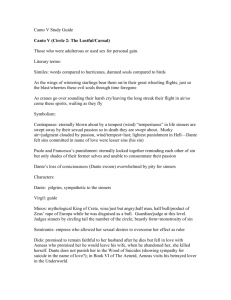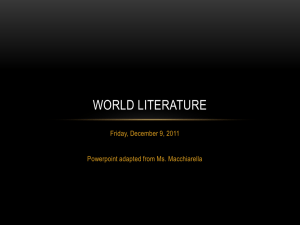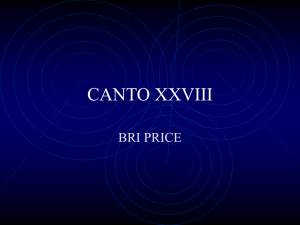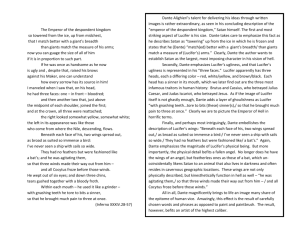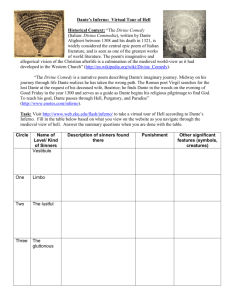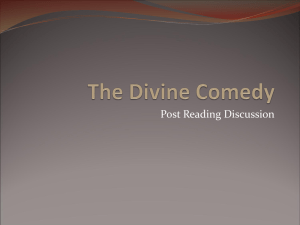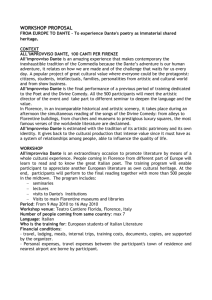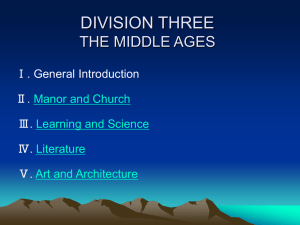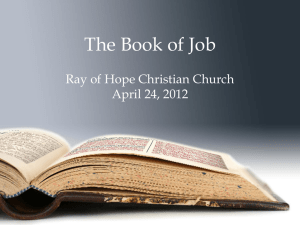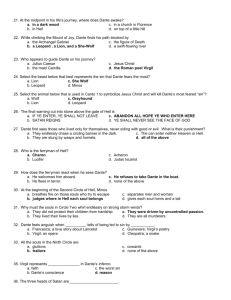The Inferno
advertisement
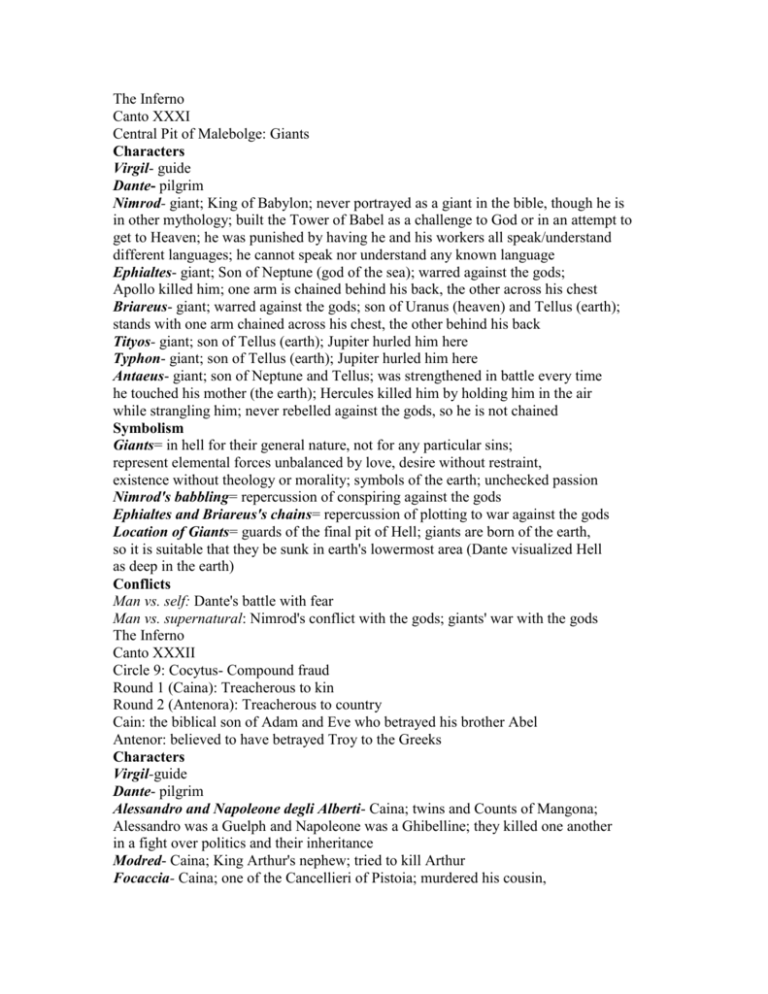
The Inferno Canto XXXI Central Pit of Malebolge: Giants Characters Virgil- guide Dante- pilgrim Nimrod- giant; King of Babylon; never portrayed as a giant in the bible, though he is in other mythology; built the Tower of Babel as a challenge to God or in an attempt to get to Heaven; he was punished by having he and his workers all speak/understand different languages; he cannot speak nor understand any known language Ephialtes- giant; Son of Neptune (god of the sea); warred against the gods; Apollo killed him; one arm is chained behind his back, the other across his chest Briareus- giant; warred against the gods; son of Uranus (heaven) and Tellus (earth); stands with one arm chained across his chest, the other behind his back Tityos- giant; son of Tellus (earth); Jupiter hurled him here Typhon- giant; son of Tellus (earth); Jupiter hurled him here Antaeus- giant; son of Neptune and Tellus; was strengthened in battle every time he touched his mother (the earth); Hercules killed him by holding him in the air while strangling him; never rebelled against the gods, so he is not chained Symbolism Giants= in hell for their general nature, not for any particular sins; represent elemental forces unbalanced by love, desire without restraint, existence without theology or morality; symbols of the earth; unchecked passion Nimrod's babbling= repercussion of conspiring against the gods Ephialtes and Briareus's chains= repercussion of plotting to war against the gods Location of Giants= guards of the final pit of Hell; giants are born of the earth, so it is suitable that they be sunk in earth's lowermost area (Dante visualized Hell as deep in the earth) Conflicts Man vs. self: Dante's battle with fear Man vs. supernatural: Nimrod's conflict with the gods; giants' war with the gods The Inferno Canto XXXII Circle 9: Cocytus- Compound fraud Round 1 (Caina): Treacherous to kin Round 2 (Antenora): Treacherous to country Cain: the biblical son of Adam and Eve who betrayed his brother Abel Antenor: believed to have betrayed Troy to the Greeks Characters Virgil-guide Dante- pilgrim Alessandro and Napoleone degli Alberti- Caina; twins and Counts of Mangona; Alessandro was a Guelph and Napoleone was a Ghibelline; they killed one another in a fight over politics and their inheritance Modred- Caina; King Arthur's nephew; tried to kill Arthur Focaccia- Caina; one of the Cancellieri of Pistoia; murdered his cousin, which began a family feud ending in the split of the Guelphs into the White and Black parties Sassol Macheroni- Caina; Florentine; appointed guardian of his nephew, but killed the nephew in order to get the inheritance for himself Alberto Camicion de' Pazzi- Caina; murdered someone in his family Carlino de' Pazzi- Alberto's relative; still alive; turned over a White castle for a bribe, and will be placed in Antenora when he dies Bocca degli Abbati- Antenora; Florentine traitor; in the battle of Montaperti, he chopped off the hand of the standard bearer (signal man) of the Florentine cavalry, and the cavalry was left without direction (defeated); Dante ripped out his hair for refusing to tell his story Tesauro dei Beccheria- Antenora; Florentine Guelphs cut off his head for plotting with the Ghibellines (who'd been expelled) Buoso da Duera- Antenora; head of a Ghibelline army specifically sent to oppose French invasion; accepted a bribe and allowed the French army to pass unopposed Gianni de' Soldanier- Antenora; Florentine Ghibelline nobleman; in 1265, he became a leader of the Guelphs (commoners) Ganelon- Antenora; betrayed Roland's position to the Saracens Tebaldello de Zambrasi- Antenora; surrendered his city, Faenza, to Bolognese Guelphs in order to take revenge on the Ghibelline family, Lambertazzi, who were seeking refuge there Symbolism Cocytus= last body of water in Hell Punishment of all in Circle 9= fixed in ice according to level of guilt, since in life they had denied love, God, and all human warmth; since they refused God's love, they're located furthest from his sun; they denied all human bonds, so they are bound only by the ice in Hell Punishment in Round 1 (Caina)= sinners are bound up to their necks, but can bend their heads down so that tears do not seal their eyes shut Punishment in Round 2 (Antenora)= sinners heads are fixed, so they are unable to keep the tears from sealing their eyes Alessandro & Napoleone's punishment= these twins had destroyed each other's lives, so in death, they are forever stuck with one another; like Paolo and Francesca, they add to one another's suffering Dante's cruel treatment of Bocca degli Abatti= Dante's complete rejection of pity for this level of sin Bottom of Hell= center of the universe; focal point of all guilt; gravity, evil, and weight drag mankind down; thus, Satan is also dragged down toward the center of all guilt, fixed forever in the ice in the lowest portion, furthest from redemption "What the hell's wrong?" etc.= punnery used to keep audience from feeling sorry for these people despite their awful situation Bocca degli Abatti's refusal to disclose identity= sinners here do not want to be remembered; Abatti's disclosing of all the other sinners' names was done in retribution Note about treachery: Dante makes no distinction between treachery against one's country and treachery against one's political party Conflicts Man vs. society: sinners' actions in life Man vs. nature: sinners' punishment (ice) Man vs. man: Alessandro and Napoleone's head butting, sinner chewing on other sinner The Inferno Canto XXXIII Circle 9: Compound Fraud Round 2: Treacherous to Country Round 3: Treacherous to Guests and Hosts Ptolemea of Maccabees—murdered father-in-law at a banquet Characters Virgil- guide Dante- pilgrim Count Ugolino- Antenora; chews on Ruggieri; Guelph; plotted with Ruggieri to get rid of his own nephew, Nino de'Visconti, in an effort to get more power; Nino died, and Ruggieri took advantage of the now weakened Guelphs, throwing Ugolino, his sons, and his grandsons in in prison; the prison was sealed a year later, and the crew was left to starve to death; the youngest grandson, Anselm, was 15; in a war with Genoa, he gave up castles to Lucca and Florence to buy these cities' neutrality, but they were already aligned with Genoa (so it was treason against his country, Pisa) Archbishop Ruggieri degli Ubaldini- Antenora; Ghibelline; plotted with Ugolino to get rid of the Guelph leader, Nino de'Visconti, then betrayed Ugolino and had him, his grandsons, and his sons sealed in a prison tower, left to starve to death Friar Alberigo- Ptolomea; Jovial Friar; his brother, Manfred, struck him during an argument; Alberigo acted as if he forgave his brother, and invited Manfred and his son to a banquet; with the signal, "Bring in the fruit," an assassin killed both Manfred and his son; his mortal body is still on earth Branca d'Oria- Ptolomea; Ghibelline of Genoa; invited his father-in-law, Michel Zanche (grafter) to a banquet and had him and his companions cut into pieces; his nephew aided him in the slaughter; mortal body still on earth Symbolism Ruggieri and Ugolino= since Ruggieri deprived Ugolino of food in life, in death he becomes the food for his starved victim; because these two plotted against their own countrymen in life before being split by betrayal, they suffer together for all eternity; they contribute to one another's misery Punishment in Round 3 (Ptolomea)= sinners lie flat while tears seal their eyes shut; subsequent tears cannot fall and they are unable to express their grief, thus adding to their agony; sins of the people in the round are so awful that their punishment begins even before their physical bodies die; demons inhabit their bodies on earth, and their souls are sent to Ptolomea to suffer Alberigo's story of Branca d'Oria= Alberigo explains that Branca's soul was in hell before Michel Zanche's, thus illustrating the fact that these sinners come to Ptolomea immediately after committing their sins Dante's broken promise to Alberigo= Dante had promised to unseal Alberigo's eyes if he would tell his story, but Dante opted not to keep his word; Dante felt that his sin was so terrible, that even being "rude to him was a courtesy" (150) Conflicts Man vs. man: Ugolino gnawing on Ruggieri; sins of those in Round 3 Man vs. self: struggle of those in Round 3 to loosen their tears and allow their grief expression Man vs. nature: sinners' plight against the ice Man vs. society: sins of those in Round 2 The Inferno Canto XXXIV Circle 9: Compound Fraud Round 4: Judecca, Treacherous to their masters Center: Satan Characters Virgil- guide Dante- pilgrim Satan- gigantic; stuck in ice; 3 pair of wings; 3 faces- one red, one yellowish white, one black Judas Iscariot- Judecca; chewed by red face; accepted money in return for turning over Jesus Christ to the Romans; head is in Satan's mouth, in much the same position as the Simoniacs Cassius- Judecca; chewed by whitish face; advised Brutus to murder Julius Caesar; lower body in Satan's mouth Brutus- Judecca; chewed by black face; lower body in Satan's mouth; killed Julius Caesar Symbolism Punishment of those in Round 4= since they betrayed their leaders in life, they are left to suffer alone in Hell; each sinner lies beneath the ice, completely frozen in uncomfortable positions; they cannot cry or communicate, just as they stole those options from their leaders Punishment of those with Satan= these are the worst of those in Round 4; these betrayals had marked effects on history and all mankind; therefore, their bodies are marked by the tearing jaws of Satan Positioning of the sinners in Satan's mouths= Judas is positioned head first and seems to suffer the harshest flaying because his sin was most offensive to God; he sold a religious icon to others for money, just as simoniacs sold favors for money; the others are left with their heads out, as their betrayals had nothing to do with religion Brutus's silence= in life, Brutus was an inherently honest man, and had been convinced that killing Caesar was what would be best for Rome; in death, he understands that his actions were misguided and he deserves his punishment Satan's faces= parody of the Holy Trinity Satan's punishment= Satan turned on God, his leader, in an attempt to gain more power, so now he is left completely powerless; he flaps his wings to escape the ice, yet the flapping merely serves to create bitingly cold winds, sealing him even more firmly in the ice; his wings create the ice in all of Circle 9 The climb= Virgil and Dante travel down Satan's side, toward his feet; in the middle, Virgil turns upside down and appears to be climbing; Dante feels they are climbing back up to Satan, but in fact, they are now climbing through the center of the earth- thus, climbing up is really climbing down his legs, up toward the surface that is the opposite side of the earth Lethe= Dante and Virgil must cross in order to get to the mount of Purgatory; in mythology, Lethe was the river of forgetfulness; Dante uses Lethe as a means for those to cleanse themselves of the memory of sin before continuing on into Purgatory Timing= Dante exits on Easter Sunday; he has experienced a spiritual rebirth, and will continue his journey heavenward Stars= every book in The Divine Comedy ends with stars, the symbol of hope and virtue Conflicts Man vs. supernatural: Satan's torment of Judas, Brutus, and Cassius; Dante's climb down/up Satan Man vs. nature: sinners' punishment in Round 4 Man vs. self: Dante's fear while climbing down/up Satan Man vs. man: betrayals committed by those in Round 4 Man vs. society: impact of the betrayals of Brutus, Cassius, and Judas
